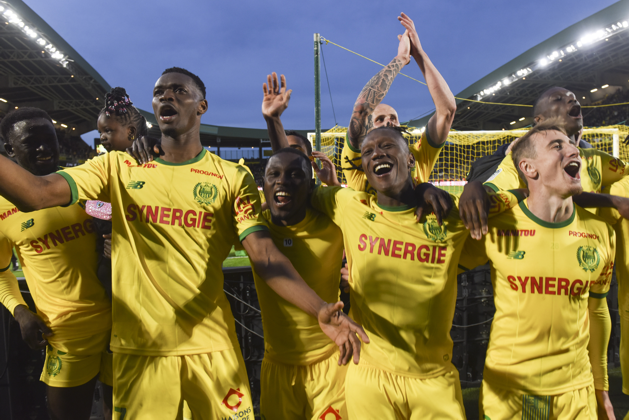The French Ligue 1 club, Nantes, is embroiled in a controversy involving their Egyptian striker, Mostafa Mohamed, who refused to participate in a crucial match against Montpellier. This game carried significant weight, not only for its implications on Nantes’ fight against relegation but also for its alignment with the international day against homophobia. Mohamed’s refusal stems from his objection to wearing a jersey featuring rainbow-colored numbers, a symbol of solidarity with the LGBTQ+ community. This isn’t the first instance of Mohamed abstaining from games associated with LGBTQ+ advocacy; he previously missed a match against Toulouse for the same reason. His representatives cited potential threats as the basis for his decision. Nantes plans to impose a fine on Mohamed, with the proceeds directed towards an organization combating LGBTQ+ discrimination.
The incident has sparked debate and criticism, particularly given the high stakes of the Montpellier match. Nantes, precariously positioned just above the relegation zone, desperately needed a win to secure their place in Ligue 1. While a draw would likely suffice due to their superior goal difference, Mohamed’s absence undoubtedly weakens the team at a critical juncture. Coach Antoine Kombouare initially attributed Mohamed’s unavailability to a minor muscle problem, a statement later contradicted by the revelation of the player’s true motives. This discrepancy further fueled the controversy, raising questions about transparency and the club’s handling of the situation.
Mohamed’s actions mirror a growing trend of footballers expressing discomfort with LGBTQ+ advocacy within the sport. Last year, Malian midfielder Mohamed Camara, then playing for Monaco, covered a pro-LGBTQ+ badge on his jersey and opted out of a pre-match photo supporting the International Day Against Homophobia, Biphobia, Interphobia, and Transphobia. Camara subsequently received a four-match ban from the French league, highlighting the league’s commitment to upholding principles of inclusivity and combating discrimination. These incidents underscore the ongoing tension between personal beliefs and the broader social responsibilities of athletes, particularly in a sport with a global reach and influence.
The clash between individual religious or cultural beliefs and the promotion of LGBTQ+ rights in football presents a complex challenge. While players are entitled to their personal convictions, the visibility and platform afforded by professional sports necessitate careful consideration of the impact of their actions. Sporting organizations increasingly emphasize inclusivity and diversity, placing pressure on players to align with these values. However, forcing athletes to endorse messages that contradict their deeply held beliefs can be perceived as infringing on their freedom of conscience. Finding a balance that respects both individual rights and the promotion of social progress remains a delicate balancing act.
This incident involving Mostafa Mohamed sheds light on the broader issue of homophobia in football. Despite progress in recent years, LGBTQ+ individuals continue to face discrimination and prejudice within the sport. The reluctance of some players to openly support LGBTQ+ initiatives underscores the persistent challenges in creating a truly inclusive environment. While disciplinary actions and financial penalties can serve as deterrents, fostering genuine understanding and acceptance requires a more comprehensive approach. Educational programs, open dialogue, and visible allyship from prominent figures within the sport are crucial to combating homophobia and promoting a culture of respect.
The case of Mostafa Mohamed and Nantes highlights the ongoing struggle to reconcile personal beliefs with the evolving social landscape of professional football. As sporting organizations increasingly embrace diversity and inclusion, players are facing greater pressure to conform to these values. The incident also underscores the need for continued dialogue and education to address homophobia and create a more welcoming environment for LGBTQ+ individuals within the sport. Finding a path forward that respects both individual freedoms and the collective responsibility to promote inclusivity will be crucial for the future of football.


